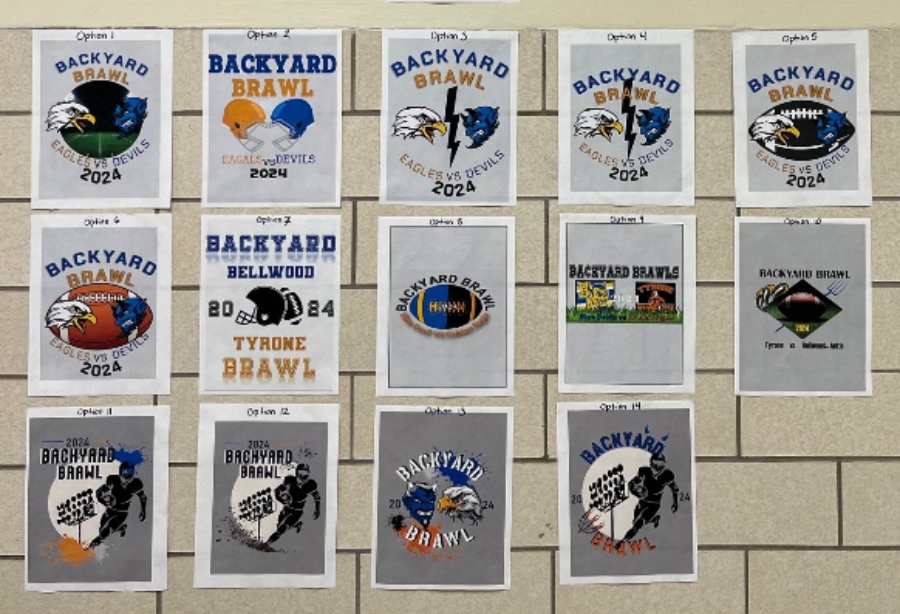If you look inside a classroom in Bellwood-Antis School District, you will usually find no sign of recycling bins. In the case you find one, it is not used for its intended purpose anymore.
Schools across the state of Pennsylvania like BAHS have converted their recycling bins into regular trash cans due to a number of obstacles, from cost to limited staff and unawareness, that stop recycling programs from taking place.
The Bellwood-Antis school district used to have a recycling program for paper in classrooms and attempted to recycle plastic and aluminum as well. The program came to unfortunate end after major issues with students and staff putting non-recyclables into the bins as well as obstacles with taking the recyclables to a processing facility in the county.
One obstacle the school district faces when it comes to recycling is a lack of supervision, revealed high school principal Richard Schreier. “Unfortunately, students don’t always read labels and put the correct items in the correct container for recycling.”
Schreier stated that a recycling program would need to be followed through outside of the building as well, such as getting the recycled goods to a processing facility. “So even if we could get the correct containers for various recyclable items, and got students and adults to properly use the new containers, we do not have a structure or vendor to take the recycled items to the next step.”
Recycling in Pennsylvania schools
The Pennsylvania DEP (Department of Environmental Protection) conducted a study for the 2022-2023 school year in which it surveyed 125 public and private schools on their current recycling practices and programs. 72% of the responding schools reported to have a recycling program in place, while 43.5% of the schools had recycling awareness programs for their students. These programs included a recycling/environmental club, posters/signage/flyers, student led recycling, and teacher led initiatives.
61.1% of these pro-recycling schools listed cardboard as their more recycled item. Other materials include:
- Aluminum
- Batteries
- Electronics
- Glass bottles/jars
- Ink/Toner
- Mixed paper
- Office paper
- Plastic bottles/jars
- Steel cans
For the schools that do not recycle, 82.9% of them stated that cost was a barrier for adding existing or new recycling programs. Schools that do not recycle also reported to have significantly less students and staff at their school than schools that do recycle, with the majority of schools listing janitorial and custodial staff (72.2%) collect the recyclables. 60% of schools also stated they had a lack of recourses such as recycling bins.
87.2% of schools do not compost organic materials, with only a slight increase in composting from last year.
Alice Flarend, Bellwood’s Energy and Environment teacher, believes recycling is incredibly beneficial. “Nothing has evolved to eat plastic because it is not a natural product, even though oil is natural. It merely breaks into tiny pieces and we have found measurable amounts in humans. It harms aquatic life, the basis of healthy oceans, and a healthy planet.”
Although she believes in the benefits of recycling, she is not sure if it would benefit the school. Flarend raised the question of how our school pays for garbage, “If we had less garbage, do we pay less?”
Obstacles blocking recycling efforts inside the classroom
Unlike many schools in Pennsylvania, Bellwood-Antis School District is not required by law to recycle. The Municipal Waste Planning, Recycling, and Waste Reduction Act of 1988 (Act 101), “Requires commercial, institutional, and municipal establishments located in Pennsylvania’s mandated municipalities to recycle high-grade office paper, corrugated paper, aluminum, and leaf waste,” according to the Pennsylvania DEP.
Those not located within mandated municipalities, such as Bellwood-Antis, are not required but are still encouraged to recycle. The mandated establishments must separate high grade office paper, corrugated paper, aluminum cans, leaf waste, and other recyclables designated by the municipality for recycling. The type and weight of materials recycled must be documented as well.
Students and staff mixing trash with the recycling is the most common challenge for schools, found the Pennsylvania DEP. Schools also have trouble adding recycling education and awareness; not only on what can be recycled but also the importance of recycling and the damage mixing trash causes. Another main cause found being a limited supply of outdoor recycling containers, as well as cost issues.
Schools report that some materials like aluminum are too expensive to recycle, and they they are not able to fund staff to [oversee the recycling process]. Rural schools may also have barriers in distance from waste collectors, while in more urban areas recycling can be cheaper than trash disposal.
“We have made several attempts at school wide recycling programs,” stated Kovac, “however we had large problems on both sides of the program.”
One of the major problems he stated was inappropriate items being placed inside the recycling bins. “When [the local waste management companies] would pick up the recycling bins, if they would see any non recyclable items they would place the entire container in the trash.”
Kovac also stated another obstacle was the minimal staffing both at the school and the waste management plant.
“We have not entirely given up on recycling though,” commented Kovac. “We do continue to run cardboard dumpsters that do get recycled and some of the kitchens do have the ability to recycle cans. ”
Kovac observed that the school utilized less garbage bags after going recycling free due to the fact they do not have to provide bags daily for two to three cans per room, therefore the school is able to save more on the large amount spent on garbage bags already. “We also don’t have the constant headache of who is placing the wrong items in the wrong cans.”
After COVID-19 an increase in schools using electronics, such as Bellwood’s iPads, have led to a need for recycling these materials. However, many schools do not have enough knowledge on what to do with these items and how to recycle them.
The Pennsylvania Department of Environmental Protection (DEP) found that during the 2022-2023 school year, 55% of schools noted that cost was a barrier preventing them from implementing a recycling program or adding more recycling efforts.
The rate remained the same from the previous school year, but spiked from only 35.2% during the 2020-2021 school year.
What are the benefits of a school recycling program?
While many school have obstacles that prevent them from recycling, overall recycling in schools makes a large impact on the environment and local ecosystems when they recycle. In some cases it can be cheaper than trash disposal. 80% of waste from schools is recyclable, found the Resource Recovery & Waste Management Division, and recycling at school creates awareness to recycle at home or in the community.
Jobs usually referred to as “green jobs” as well as business development and entrepreneurial activity are created due to recycling. These jobs can be focused around collecting recyclables and manufacturing bins and other recourses used for recycling. Many raw materials are also produced for industries due to recycling.
Recycling also saves the excessive need for natural recourses and landfill space. Recycling common materials such as aluminum, paper, plastic, glass, and steel can save large amounts of virgin non-renewable materials such as oil, trees, metal ores, water, carbon emissions, and energy. Pollution is cut short due to recycling by reducing the amount of oil and water produced that damages the air, soil, and water.
One of Flarend’s students, Maddalena Pulcinello, is an advocate for environmentalism and has recently proposed starting an environmental club at BAHS.
“We only have one planet to call home and our well-being, comfort, and survival depend on having a health environment. My mother taught me from a young age to care for our environment and it remains an issue I am passionate about.”
Pulcinello came up with the idea to advocate for an environmental club after noticing large amounts of trash on the ground around the area. “After sports events, parades, and other town events our grounds are left covered with trash even with trash cans nearby.”
Pulcinello believes that an environmental club can help implement a recycling program into the school again by posting advertisements that encourage people to recycle, and placing an information poster above recycling bins to explain how to use them correctly.
“Our school district would be leading by example and instill a sense of importance towards the environment to our students,” Pulcinello commented.
School recycling programs “should be a hands-on, interdisciplinary lesson that educates students about the environment, personal responsibility, community action, and solid waste management” according to the North Carolina Division of Environmental Assistance and Customer Service.
Our school district would be leading by example and instill a sense of importance towards the environment to our students.
— Maddalena Pulcinello
In 2021, the Pennsylvania DEP released their recommended steps for implementing a successful recycling program in schools.
Buy a fair amount of commercial recycling bins
- Place in commonly used spaces
- Don’t have to be complicated or expensive
- Small bins in classrooms and large ones in communal areas
- Make them well-marked
Educate staff and students on recycling procedures
- Make recycling fun!
- Issue a memo or throw a kickoff party at the beginning of each school year or semester
- Posters, stickers, and magnets that label what goes in each recycling container can be used to help students identity what can and cannot be recycled
- Have recycling information in new student and employee orientations
Publicize recycling procedures through the school’s website, handbook, and other activities
- The more the students, faculty, and community know about the school’s recycling measures, the more likely they will be willing to participate
Create a log book or other system to record the amount of recyclables in order to receive:
- The right amount of compensation for materials or
- In order to take measures if amounts change
Utilize custodial staff to oversee the program and train them on recycling procedures
- Recognize that areas with mixed-material problems and where students and staff are not recycling in order to make changes in those areas
The list also added extra steps that count be taken such as composting food waste and banning single use plastics from the school premises. Read more about their plan here if you wish to start implementing a recycling program in your school or community.
The Pennsylvania Department of Environmental Protection (DEP) found that during the 2022-2023 school year, 73.3% of schools have recycling bins in their classrooms, which is also the most common area for the bins to be.
The survey found that the most common areas, beside the classroom, for recycling bins to be found in schools are the auditorium (22.2%), cafeteria (55.6%), copy areas (34.4%) gym (22.2%), hallways (25.6%), office (40%), and stadiums (23.3%).
The number of bins inside the classroom itself increased by 10% from the previous school year.












